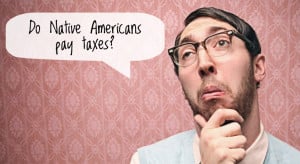
Confused person in glasses stands against pink wallpaper, asking “Do Native Americans pay taxes?”
I recently testified in support of a bill that would limit the use of offensive Native American mascots at public K-12 schools in Colorado.
During testimony, one of the education committee members made a comment about how, after his own high school in Kansas removed the word “Kiowa” from its mascot name and logo, it was like the culture disappeared.
“It was gone,” the representative said.
The testimony room was filled with Native people, and we all sat in a sort of collectively stunned silence.
Then there were snickers.
How, I thought, could this smart, educated person sitting on our state’s education committee think that to remove the word “Kiowa” somehow equated the loss of a whole culture?
Ridiculous, right?
Except this lawmaker is hardly alone when it comes to the lack of understanding and knowledge regarding the cultures, lifestyles, and issues facing contemporary Native Americans.
I’m always surprised when faced with such blatant ignorance, because you’d think as the nation’s first peoples, our cultures would be the first thing taught in schools. Like, “Hey. We’re occupying your tribal homelands, maybe the least we could do is learn some stuff about you.”
I’m not saying I expect anyone to be an expert in Native cultures (and, to review, we’re talking thousands of federally recognized and unrecognized tribes throughout the US, each of those with its own unique heritage and contemporary issues), but it’d be great if people on airplanes would stop asking if I lived in a tipi or still hunted buffalo.
I want to answer them with “Sure. Just like I’m sure your people still throw feces out of windows and onto cobble-stoned streets.”
Beyond the comments that suggest people view us as relics of the past (“What?! You’re still here?”), which is problematic for many reasons, but especially because it makes our issues tough to advocate for if the masses can’t even see you, Natives also face contemporary stereotypes.
“Why don’t you pay taxes? Why aren’t you patriotic? Why do you get all kinds of free stuff?” These are some of the more common questions we’re bombarded with.
Statements like these highlight the many real ways society belittles us as dependent people incapable of doing things for ourselves, including healing from more than 500 years of oppression and genocide.
Many of us feel like if public school systems did a better job of educating kids from an early age regarding Native cultures and influence, we’d all be a lot better off.
While some states are doing great things by revamping curriculums to include indigenous studies, most are failing – and we get dismissive comments like the one from the Colorado representative.
Absent of widespread and comprehensive culturally infused curriculums, I’ve answered your burning questions below.
1. Do Native Americans Pay Taxes?
It being tax season and all, I wish I could say, “Nope. Our nation’s founding fathers realized a great way to repay its indigenous people back for hundreds of millions of lives and lands taken was to fully remove our tax burdens.”
Alas, like any other US citizen, we pay federal taxes and have to cough up state, local, and sales taxes when we live, go shopping, or do business off-reservation. However, state income taxes are not paid on reservation or trust lands.
As sovereign entities, levying taxes on reservation lands is a power some tribal governments flex. Some don’t. The Navajo Nation, for instance, recently passed a 2% “sin tax” on junk food, the first of its kind in the US, with generated funds going toward more sustainable and traditional food options.
That’s the basics of Natives and taxes, but like everything tax-related, it gets more complicated than that.
The myth that Natives don’t pay taxes is deeply rooted in classist ideology that tells us that poor people are a burden on the economy and society in general.
In my home state of South Dakota, there are reservations with unemployment rates higher than 60%. Nationwide, more than one in four Native Americans live in poverty.
Before you make a snap judgment:
- Consider how large and rural reservations are (my tribe is about the size of Connecticut, with about 8,000 people living there, according to 2010 Census figures).
- Consider that those Natives with jobs often have to travel great lengths within or outside of their reservations in order to work. A lot of these jobs are government jobs, subject to budget cuts and restrictions that limit growth.
- And consider that Natives living on reservations often have to spend their money outside of their own communities because the businesses and resources they need – from hair stylists to medical specialists –are located elsewhere.
When you take into account some of the hardships and reasons behind the poverty, you can begin to understand that Native economies are not sustainable when they are forced to follow a Western model of success.
2. Why Do Natives Get Free Stuff, Like Money, Food, and Healthcare?
Let me break it down for you: We don’t.
Just because we’re Native doesn’t mean we get free stuff. In a cruel twist of fate, being Native does guarantee we’ll be at the bottom of every socioeconomic ranking imaginable.
Where does this question come from?
The US entered into hundreds of legally binding contracts with tribes (called treaties) that essentially promised benefits and annuities from the US to federally recognized tribes in exchange for Natives vacating lands white settlers wanted.
Remember, there are thousands of tribes in the US, but only 566 are federally recognized. Convenient for a government that owes tribes money, eh?
So, “You leave your homelands and holy grounds, stop using your hunting and fishing land, and promise never to bother these nice, white folks, and we promise to set aside other areas for you to live, and provide you and your descendents with goods and services to make up for your many, many losses.”
The US broke pretty much every single one of its treaty promises to tribes (ironic that kind of behavior is racistly referred to as being an “Indian giver” today); we know this just by looking at modern US territories.
As a sort of band-aid for broken treaties and genocide, the federal government (limply) funnels money to Indian Country programs they are obligated to fund. This is not welfare; we’re talking a bill of sale the terms of which the government itself outlined.
These programs include building or maintaining K-12 schools, Indian Health Service clinics, and housing, among others. Commodity food programs, WIC, TANF, and other federal programs available to all US citizens are also offered.
But like everything not defense-related in this country, these programs are at the bottom of the federal priority ladder.
Bear in mind the graduation rate for Native youth nationwide is 51%, and access to quality housing and healthcare is lacking on most reservations, meaning, among other things, these programs are inadequately funded.
Those statistics, which fluctuate based on which reservation or state you’re looking at, always punch me in the gut. I don’t live on the reservation, but many of my tiospaye – family – do.
There are so many beautiful things about reservation life and being surrounded by family and culture, but in terms of economy, health, and education, we’re often describing third-world conditions, folks.
Beyond these programs, some tribes and/or individual tribal members receive lease payments directly from the government for land held in trust, primarily used for mining, ranching, timber, and other purposes (which rarely benefit Natives).
This is a basic landlord/tenant business relationship, and tribes that receive these payments will often distribute the funds among its members as a “per cap” or per capita monetary distribution.
Finally, some tribes – not all – flex their economic sovereignty by building and owning casinos. For the most part, Indian gaming isn’t all it’s made out to be.
A few tribes, like the Shakopee Mdewakanton Sioux Community located southwest of the Twin Cities in Minnesota, have fantastically successful operations and are able to share wealth not only with its tribal members, but other tribal nations, as well.
Others, like the Mashantucket (Western) Pequot Tribal Nation in Connecticut, are struggling to dig themselves out of billions in debt from casino losses.
The point is, we have a sovereign right to earn money (or not earn money) from these casinos (or other enterprises) and expect the government to make good on its treaty obligations.
3. Why Do Natives Get to Go to Any College They Want Without Working for It?
This question rankles for me as an academic – because if you’ve been following along, then you noticed that only about half of all Native youth graduate high school.
Let me say how truly unacceptable that is for a developed and civilized nation.
So for those of us who make it through high school and enter college, we get these “box-checker” accusations thrown at us: “You’re only here because you checked that you were American Indian on the college application.
This statement is devastating on so many levels, but mostly because it ignores everything we went through – everything our families went through – and survived to get to college.
Natives work hard in high school, earn good grades, apply, and are accepted to colleges just like everyone else. We have the same academic standards to meet in order to remain in college.
We have the added bonus of having survived systemic oppression in the form of debilitating poverty, colonial-based education dismissive or ignorant of indigenous experiences, and limited access to necessary healthcare, including mental health.
Native people make up less than 1% of college students nationally, yet somehow we’re to blame when a non-Native kid doesn’t get in.
For more on Natives and the college experience, please check out this post and this post by the brilliant Dr. Adrienne Keene, a member of the Cherokee Nation of Oklahoma.
4. Why Are Natives Unpatriotic?
This sentiment came to a head earlier this year after 57 students – ages 8 to 13 – from the Pine Ridge Indian Reservation had beer and verbal assaults, including racist slurs, thrown on them at a hockey game in nearby Rapid City, South Dakota.
The kids were there with chaperones to celebrate academic achievement, and after the story broke about the incident, the Rapid City Journal newspaper ran this headline: “Did Native students stand for National Anthem?”
I can’t even begin to describe the outrage felt in Indian Country over this incident, let alone this irresponsible headline that suggested the Native youth deserved to be assaulted.
It represents the kind of dubious logic lots of people have in this country when it comes to Natives and US patriotism.
First things first: Lots of people are unpatriotic. It’s a constitutional freedom of expression not to stand for or sing the Pledge of Allegiance or National Anthem or celebrate Independence Day.
Being unpatriotic does not warrant harassment or violence, especially against children.
It’s also super-unfair to suggest an entire race of people is unpatriotic just because many of us are vocal about the systemic oppression we face in this country.
True, if anyone had a reason to be unpatriotic for past and present crimes committed against us, it’s Natives. But I digress.
Let’s discuss World War II and how the Allies totally owe everything to the awesomeness of indigenous languages and the code talkers who used them to transmit messages the Axis powers were never able to crack.
Or let’s review enlistment numbers based on race, and how Natives consistently have the highest rate of military service per capita.
Even at the start of our own celebrations, we always honor the American flag, veterans, and service members alongside the flags and elders of our tribal nations.
I highly suggest easing into the subject of patriotism and code talkers, in particular, with these amazing stories from INC Comics, Tales of the Mighty Code Talkers.
Regardless of our known or unknown patriotism, we’re dual citizens of our tribes and the US, which means we have an inherent interest in seeing this country succeed, if only because we continue to survive and thrive on the same land our histories originated.
To succeed, a country needs criticism, especially from those it has marginalized for centuries.
To me, criticism means you care. What is more patriotic than that?
***
Educating US citizens about Native people is imperative for nation-to-nation knowledge and understanding. This is possible by urging your state lawmakers to revamp curriculums to incorporate indigenous studies.
Too many people (lawmakers included) know little to nothing substantial about Natives, which makes our issues – from cultural appropriation to access to birth control – tough to advocate.
By answering these common questions, I hope to quell some of the more pervasive stereotypes surrounding Native people today.
[do_widget id=”text-101″]
Taté Walker is a Contributing Writer for Everyday Feminism. She is a Mniconjou Lakota and an enrolled citizen of the Cheyenne River Sioux Tribe of South Dakota. She is a freelance journalist who lives in the Colorado Springs area. She blogs at Righting Red and can be reached on www.jtatewalker.com. You can check her out on Twitter @missustwalker.
Search our 3000+ articles!
Read our articles about:
Our online racial justice training
Used by hundreds of universities, non-profits, and businesses.
Click to learn more




















